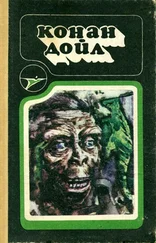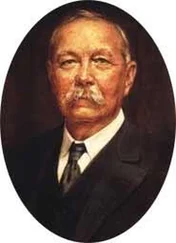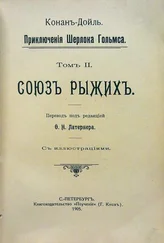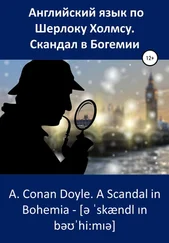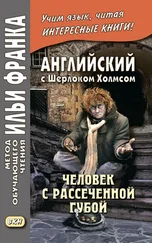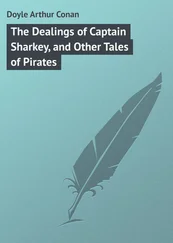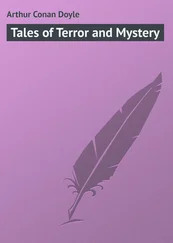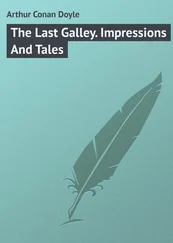The return journey was less difficult, as they had already blazed a path for themselves.
Before evening they found themselves once more at the Bay of Palms(прежде чем /наступил/ вечер, они снова оказались в Пальмовой бухте) , and saw their ship riding at anchor where they had left her(и увидели свой корабль, стоящий на якоре там же, где они его оставили) . Their boat and oars had been hauled up among the bushes(/перед началом похода/ они выволокли свою лодку с веслами /на берег и оставили/ в кустах) , so they launched it and pulled out to the barque(так что они спустили ее на воду и направились к барку; to launch – бросать с силой, метать; спускать судно на воду; to pull out – отправляться, отходить /о поезде, пароходе/ ).
“No luck, then!” cried Joshua Hird, the mate(выходит, не судьба! – крикнул помощник капитана Джошуа Хирд; luck – везенье, удача ) , looking down with a pale face from the poop(/стоя/ на полуюте с бледным лицом и глядя вниз /на них/).
“His camp was empty, but he may come down to us yet(его лагерь пуст, но он еще может прийти к нам = попасться нам) ,” said Craddock, with his hand on the ladder(сказал Крэддок, /хватаясь/ рукою за трап).

 Before evening they found themselves once more at the Bay of Palms, and saw their ship riding at anchor where they had left her. Their boat and oars had been hauled up among the bushes, so they launched it and pulled out to the barque.
Before evening they found themselves once more at the Bay of Palms, and saw their ship riding at anchor where they had left her. Their boat and oars had been hauled up among the bushes, so they launched it and pulled out to the barque.
“No luck, then!” cried Joshua Hird, the mate, looking down with a pale face from the poop.
“His camp was empty, but he may come down to us yet,” said Craddock, with his hand on the ladder.
Somebody upon deck began to laugh(кто-то на палубе засмеялся: «начал смеяться») . “I think,” said the mate, “that these men had better stay in the boat(я думаю, – сказал помощник, – что этим людям лучше остаться в лодке) .”
“Why so(почему так) ?”
“If you will come aboard, sir, you will understand it(если вы подниметесь на борт, сэр, то поймете это) .” He spoke in a curious hesitating fashion(он говорил как-то странно и нерешительно; to speak; to hesitate – колебаться, не решаться; fashion – форма, очертания; манера поведения ).
The blood flushed to Craddock’s gaunt face(кровь прилила к суровому лицу Крэддока).
“How is this, Master Hird?” he cried, springing up the side(что такое, мастер Хирд? – воскликнул он, запрыгивая на борт) . “What mean you by giving orders to my boat’s crew(как вы смеете отдавать приказы моей шлюпочной команде; to mean – намереваться, иметь в виду; значить, означать ) ?”

 Somebody upon deck began to laugh. “I think,” said the mate, “that these men had better stay in the boat.”
Somebody upon deck began to laugh. “I think,” said the mate, “that these men had better stay in the boat.”
“Why so?”
“If you will come aboard, sir, you will understand it.” He spoke in a curious hesitating fashion.
The blood flushed to Craddock’s gaunt face.
“How is this, Master Hird?” he cried, springing up the side. “What mean you by giving orders to my boat’s crew?”
But as he passed over the bulwarks(но, когда он перелезал через фальшборт) , with one foot upon the deck and one knee upon the rail(одной ногой /уже стоя/ на палубе, а коленом /другой еще касаясь/ планшира) , a tow-bearded man, whom he had never before observed aboard his vessel(матрос с /похожей на/ паклю бородой, которого он никогда прежде не видал: «не наблюдал» на борту судна; tow – кудель, очес; пакля ) , grabbed suddenly at his pistol(вдруг завладел его пистолетом; to grab – хватать; захватывать, присваивать ) . Craddock clutched at the fellow’s wrist(Крэддок ухватил парня за запястье) , but at the same instant his mate snatched the cutlass from his side(но в тот же миг его товарищ = другой матрос выдернул у него /висевшую/ на боку саблю; to snatch – хватать; cutlass – абордажная сабля; кортик ).
“What roguery is this?” shouted Craddock looking furiously around him(что за шутки? – в ярости заорал Крэддок, оглядываясь вокруг; roguery – мошенничество; шалости; rogue – негодяй, мерзавец, жулик, мошенник ).

 But as he passed over the bulwarks, with one foot upon the deck and one knee upon the rail, a tow-bearded man, whom he had never before observed aboard his vessel, grabbed suddenly at his pistol. Craddock clutched at the fellow’s wrist, but at the same instant his mate snatched the cutlass from his side.
But as he passed over the bulwarks, with one foot upon the deck and one knee upon the rail, a tow-bearded man, whom he had never before observed aboard his vessel, grabbed suddenly at his pistol. Craddock clutched at the fellow’s wrist, but at the same instant his mate snatched the cutlass from his side.
“What roguery is this?” shouted Craddock looking furiously around him.
But the crew stood in little knots about the deck(но команда, стоявшая на палубе небольшими группами; to stand ) , laughing and whispering amongst themselves(ухмылялась и перешептывалась между собой) without showing any desire to go to his assistance(не выказывая никакого = ни малейшего желания прийти к нему на помощь) . Even in that hurried glance Craddock noticed(даже при таком беглом взгляде Крэддок заметил; hurried – быстрый, поспешный ) that they were dressed in the most singular manner(что одеты они были в весьма необычной манере; singular – исключительный, необыкновенный ) , with long riding-coats, full-skirted velvet gowns and coloured ribands at their knees(в долгополых куртках для верховой езды, богато украшенных бархатных кафтанах и с цветными лентами у колен; full – полный, целый; богатый, изобилующий; to skirt – окружать, окаймлять ) , more like men of fashion than seamen(больше походя на светских модников, чем на моряков) . As he looked at their grotesque figures(глядя на их нелепые фигуры) he struck his brow with his clenched fist(он, стиснув кулак, ударил себя по лбу; to strike; brow – бровь; лоб, чело /поэт./ ) to be sure that he was awake(чтобы убедиться, что это не сон; awake – не спящий, бодрствующий ).
Читать дальше
Конец ознакомительного отрывка
Купить книгу
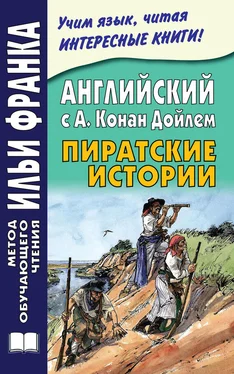

 Before evening they found themselves once more at the Bay of Palms, and saw their ship riding at anchor where they had left her. Their boat and oars had been hauled up among the bushes, so they launched it and pulled out to the barque.
Before evening they found themselves once more at the Bay of Palms, and saw their ship riding at anchor where they had left her. Their boat and oars had been hauled up among the bushes, so they launched it and pulled out to the barque.

